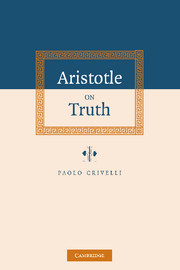Book contents
- Frontmatter
- Contents
- Acknowledgements
- Notes on the text
- List of abbreviations of titles of Aristotle's works
- Introduction
- Part I BEARERS OF TRUTH OR FALSEHOOD
- Part II ‘EMPTY’ TERMS
- Part III TRUTH AND TIME
- Chapter 6 Truth and change
- Chapter 7 Truth and Determinism in de Interpretatione 9
- Appendix 1 Metaph. Θ 10, 1051b1: the text
- Appendix 2 Metaph. Θ 10, 1051b2–3: the text
- Appendix 3 Int. 7, 17b16–18: the text
- Appendix 4 The two-place relations in Aristotle's definition of truth
- Appendix 5 Aristotle's theory of truth for predicative assertions: formal presentation
- Appendix 6 The failure of bivalence for future-tense assertions: formal presentation
- References
- Index of names
- Index of subjects
- Index of passages
Chapter 6 - Truth and change
Published online by Cambridge University Press: 22 September 2009
- Frontmatter
- Contents
- Acknowledgements
- Notes on the text
- List of abbreviations of titles of Aristotle's works
- Introduction
- Part I BEARERS OF TRUTH OR FALSEHOOD
- Part II ‘EMPTY’ TERMS
- Part III TRUTH AND TIME
- Chapter 6 Truth and change
- Chapter 7 Truth and Determinism in de Interpretatione 9
- Appendix 1 Metaph. Θ 10, 1051b1: the text
- Appendix 2 Metaph. Θ 10, 1051b2–3: the text
- Appendix 3 Int. 7, 17b16–18: the text
- Appendix 4 The two-place relations in Aristotle's definition of truth
- Appendix 5 Aristotle's theory of truth for predicative assertions: formal presentation
- Appendix 6 The failure of bivalence for future-tense assertions: formal presentation
- References
- Index of names
- Index of subjects
- Index of passages
Summary
This chapter addresses the relationship of truth to time and change. According to Aristotle, any bearer of truth or falsehood can, at least in principle, be true at one time and false at another. This is somewhat hard to square with his view that the linguistic items that are bearers of truth or falsehood are utterances (expression-tokens). On reflection, however, the position turns out to be consistent: utterances (expression-tokens) can be true at one time and false at another.
Aristotle also claims that if an assertion or a belief is true at one time and false at another, it does not follow that it undergoes a change. This is probably due to the idea that truth (being correspondence to the world) is something like a relative and therefore, like relatives, is involved at most in a ‘mere Cambridge change’ that does not count as a genuine change. Now, properties involved in a ‘mere Cambridge change’ are not genuine properties. It follows that truth is not a genuine property.
DIFFERENT TRUTH-VALUES AT DIFFERENT TIMES
Truth and falsehood at times. Aristotle thinks that the bearers of truth or falsehood are true, or false, at times. He does not formulate this view explicitly: nowhere does he use a sentence like ‘States of affairs, beliefs, and assertions are true or false not absolutely, but at times.’
- Type
- Chapter
- Information
- Aristotle on Truth , pp. 183 - 197Publisher: Cambridge University PressPrint publication year: 2004



